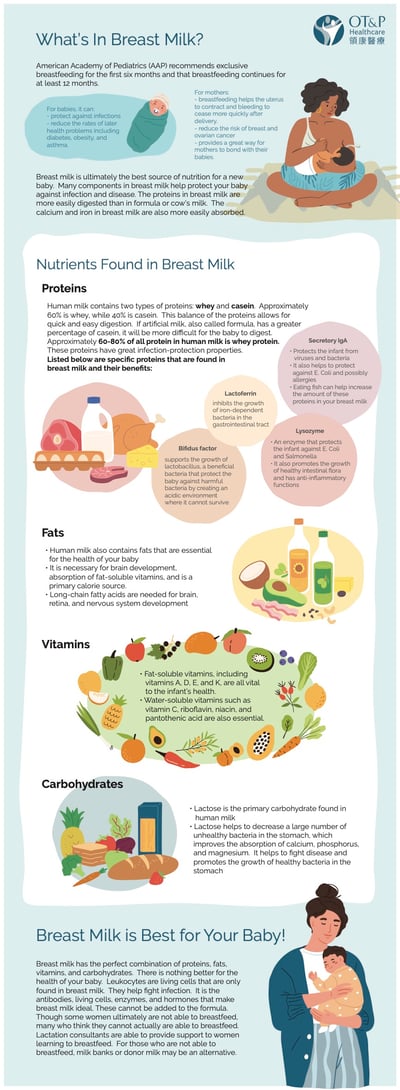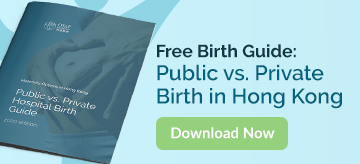Picture yourself in a rocking chair, holding your new baby close to your chest, providing your sweet little one with warmth, comfort and the best possible nutrition. Breastfeeding is a treasured bonding time where you get to know and nourish your baby.
Hong Kong has made great strides in maternity rights and implemented a support network for new breastfeeding mothers in the city. The ongoing efforts to promote breastfeeding by encouraging progressive hospital practices and promoting breastfeeding-friendly workplaces have brought results over recent years. In 2024, the breastfeeding rate in Hong Kong has reached an all-time high of 83.6% in public and private hospitals combined [1].
There are many advantages of breastfeeding for moms and babies. While some women around the world encounter obstacles to breastfeeding, Hong Kong moms can breastfeed as a fundamental human right. This article will discuss the benefits of breastfeeding, the obstacles mothers may encounter, and the articles that protect Hong Kong mothers who breastfeed.
The Importance of Breastfeeding
In addition to reducing rates of breast, uterine, cervical and ovarian cancer in mothers, breastfeeding provides many advantages to both the physical and emotional health of the baby.
- According to a 2016 study, breastfeeding benefits are long-lasting. Adults who were breastfed as babies:
- Scored lower in psychological traits like neuroticism, anxiety, and hostility, and
- Scored higher in openness and optimism than those not breastfed [2].
- Breast milk contains antibodies that fight viruses and bacteria, reducing the occurrence of common issues like:
- Ear infections
- Respiratory infections
- Viruses
- Allergies
- Gastrointestinal disorders
- Diabetes
- Certain childhood cancers
Is Breastfeeding Legal in Hong Kong?
Although public breastfeeding is a subject of cultural controversy, it is legal in the city.
The United Nations Convention on the Rights of the Child (CRC) came into force in Hong Kong in 1994. The document preserves your baby’s rights to growth and development (Article 6), and the highest achievable standard of health (Article 24). This means that the government has the duty of educating parents about the benefits of breastfeeding, and of providing families with breastfeeding support.
Challenges of Breastfeeding in Hong Kong
Although the Department of Health introduced supportive breastfeeding initiatives that led to the increase of breastfeeding mothers in 2015 (up to 89% of mothers in Hong Kong), many mothers give up the practice within just a few months. There are a few reasons for this.
#1: Workplace Responsibilities
Women stop breastfeeding in the first three months after birth due to work responsibilities [3]. Maternity leave in the city usually lasts for 14 weeks [4] and flexible working arrangements are hard to negotiate with many employers.
Since 2015, the Hong Kong government has been trying to fight discrimination. The Food and Health Bureau (FHB) encouraged government and private facilities to implement “breastfeeding-friendly workplace” policies and measures to facilitate new moms to continue breastfeeding after their return to work [5]. In addition, the Department of Health has issued guidelines for employers who wish to establish a breastfeeding-friendly workplace [6].
On June 11th, 2020 the Equal Opportunities Commission (EOC) passed an amendment together with the Discrimination Legislation (Miscellaneous Amendments) Bill 2018 in the Legislative Council. The amendment commenced on 19th June 2021 and effectively makes it illegal to discriminate against breastfeeding women in the workplace[9].
#2: The Use of Infant Formula in Hospitals
Secondly, the sale of infant formula has become a multi-billion dollar business and thus, the marketing has gotten more and more aggressive through the years. Paired with the difficulties, such as pain during breastfeeding, an inadequate latch or milk transfer, many mothers have opted to use formula instead.
However, the promotion of substituting breast milk with formula in Hong Kong hospitals is slowing down significantly. The Baby-Friendly Hospital Initiative Hong Kong Association (BFHI) has established Ten Steps to Successful Breastfeeding, and the results have been positive with 88% of public and 64% of private hospitals in 2019 not offering any food or drink other than breastmilk to breastfed babies unless medically indicated [1].
Learn more about what is in Breast Milk and what foods to avoid when breastfeeding. You can view and download the full infographic here.
#3: Social Discrimination
Finally, as we mentioned previously, breastfeeding in public is still considered taboo. According to UNICEF, more than 80 per cent of breastfeeding Hong Kong mothers have fed their babies in public, and 40 per cent of them have encountered uncomfortable situations.
While breastfeeding in public is legal, many women struggle with this negative treatment. In 2016, 100 mothers gathered in the city to protest the stigma of breastfeeding in Hong Kong. The mothers breastfed their babies out in public at Tai Wai train station. These mothers passionately feel that breastfeeding is seen as a healthy, normal part of daily life.
In 2020, we have seen the COVID-19 pandemic affect the lives of many breastfeeding mothers alike. In April last year, breastfeeding women in Hong Kong united to help a mother diagnosed with the virus by donating breast milk for a baby who could not consume their mother’s milk.
How OT&P Supports Breastfeeding Women
Whether you’re expecting or have already welcomed your little one into the world, OT&P has a variety of services to support you in providing the best nutrition for your baby.
Our antenatal classes provide breastfeeding preparation for expectant parents, along with childbirth education and prenatal classes between 26 and 30 weeks. We also teach breastfeeding skills and provide support in the postnatal period through clinic consultations, phone/video calls, or the open mum & baby walk-in clinic.
Besides that, we tailor home visits according to your family’s needs and help you prevent common breastfeeding issues like:
- Breast pain or mastitis
- Feeding positions
- Review infant latch
- Breastfeeding frequency and duration
- How to tell if your baby is getting enough milk
You can choose whatever option works best for your growing family. Having direct access to midwives will allow you to have constant breastfeeding support so you can give your baby the best start in life.
Book an Appointment
References
- Unicef Hong Kong, & Baby Friendly Hospital Initiative. (2024). World Breastfeeding Week (WBW) 1-7 August 2024 Support Breastfeeding for a Healthier Planet. Retrieved December, 2024, from https://www.babyfriendly.org.hk/wp-content/uploads/2024/08/2024-WBW-Annual-Survey_E.pdf
- Sutin, A. R., Stephan, Y., & Terracciano, A. (2016). Breastfeeding and Adult Personality. European Journal of Personality, 30(5), 484-491. doi:10.1002/per.2030
- Hong Kong Department of Health. (2016). Public Perception Survey on Breastfeeding. Retrieved January, 2021, from https://www.fhs.gov.hk/english/archive/files/reports/public_perception_survey_on_breastfeeding(eng)_final.pdf
- Hong Kong Labour Department. (2020). The Employment (Amendment) Ordinance 2020. Retrieved January 06, 2021, from https://www.labour.gov.hk/eng/news/EAO2020.htm
- Government strives to promote support for breastfeeding among different sectors of the community and the general public. (n.d.). Retrieved January 06, 2021, from https://www.info.gov.hk/gia/general/201612/06/P2016120600935.htm
- Family Health Service. (2017). Employers' Guide - to Establishing Breastfeeding Friendly Workplace. Retrieved January 06, 2021, from https://www.fhs.gov.hk/english/breastfeeding/30031.html
- Daily Mail (2016, May 07). Hong Kong mothers stage BREASTFEEDING flashmob at Metro station to protest discrimination. Retrieved January 06, 2021, from https://www.dailymail.co.uk/news/article-3578444/Lactivists-Hundreds-mothers-stage-BREASTFEEDING-flashmob-Hong-Kong-station-protest-discrimination.html
- Hong Kong Free Press. (2020, April 27). Moms in Hong Kong rally to donate vital breastmilk during Covid-19. Retrieved January 06, 2021, from https://hongkongfp.com/2020/04/27/moms-rally-to-donate-vital-breastmilk-in-hong-kong-during-covid-19/
- Retrieved December 16, 2024, from https://www.bdo.global/en-gb/microsites/tax-newsletters/ges-news/may-2021-issue/hong-kong-employers-and-provisions-on-prohibiting-breastfeeding-discrimination-and-harassment
 Central General Practice
Central General Practice
 Repulse Bay
Repulse Bay
 Clearwater Bay
Clearwater Bay
 Central Specialist Clinic
Central Specialist Clinic
 BodyWorX Clinic
BodyWorX Clinic
 MindWorX Clinic
MindWorX Clinic
 Partner Clinics
Partner Clinics
 Family Clinic
Family Clinic
 OT&P Annerley Midwives Clinic
OT&P Annerley Midwives Clinic




